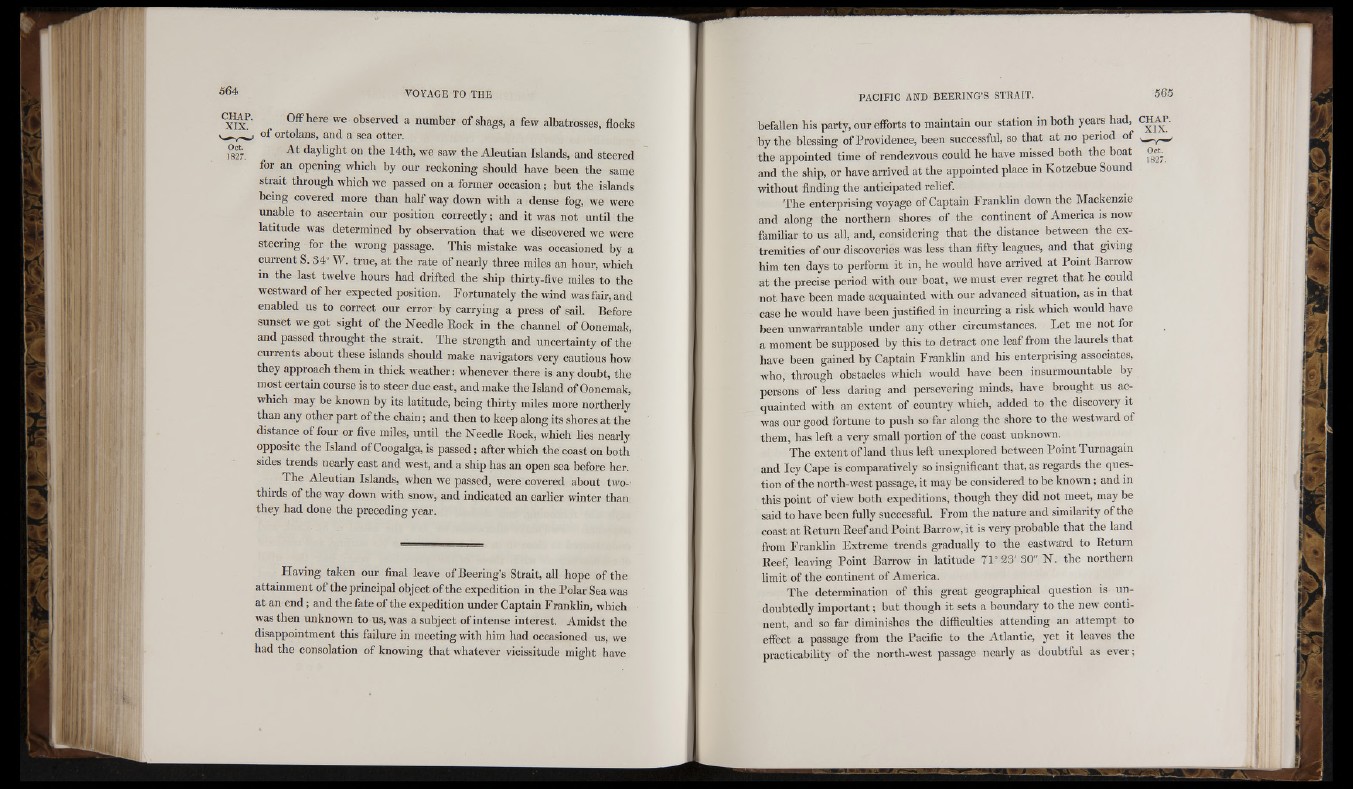
Offhere we observed a number of shags, a few albatrosses, flocks
of ortolans, and a sea otter.
At daylight on the 14th, we saw the Aleutian Islands, and steered
for an opening which by our reckoning should have been the same
strait through which we passed on a former occasion; but the islands
being covered more than half way down with a dense fog, we were
unable to ascertain our position correctly; and it was not until the
latitude was determined by observation that we discovered we were
steering for the wrong passage. This mistake was occasioned by a
current S. 34° W . true, at the rate of nearly three miles an hour, which
in the last twelve hours had drifted the ship thirty-five miles to the
westward of her expected position. Fortunately the wind was fair, and
enabled us to correct our error by carrying a press of sail. Before
sunset we got sight of the Needle Eock in the channel of Oonemak,
and passed throught the strait. The strength and uncertainty ofth e
currents about these islands should make navigators very cautious how
they approach them in thick w'eather; whenever there is any doubt, the
mort certain course is to steer due east, and make the Island of Oonemak,
which may be known by its latitude, being thirty miles more northerly
than any other part of the chain; and then to keep along its shores at the
distance of four or five miles, until the Needle Eock, which hes nearly
opposite the Island of Coogalga, is passed; after which the coast on both
sides trends nearly east and west, and a ship has an open sea before her.
The Aleutian Islands, when we passed, were covered about two-
thirds of the way down with snow, and indicated an earlier winter than
they had done the preceding year.
Having taken our final leave of Beering’s Strait, all hope of the
attainment of the principal object ofthe expedition in the Polar Sea was
at an en d ; and the fate of the expedition under Captain Franklin, which
was then unknown to us, w'as a subject of intense interest. Amidst the
disappointment this failure in meeting with him had occasioned us, we
had the consolation of knowing that whatever vicissitude might have
<|l
befallen his party, our efforts to maintain our station in both years had, CH/^P.
by the blessing of Providence, been successful, so that at no period of .— ^— ,
the appointed time of rendezvous could he have missed both the boat ore
and the ship, or have arrived at the appointed place in Kotzebue Sound
without finding the anticipated relief.
The enterprising voyage of Captain Franklin down the Mackenzie
and along the northern shores of the continent of America is now
familiar to us all, and, considering that the distance between the extremities
of our discoveries was less than fifty leagues, and that giving
him ten days to perform it in, he would have arrived at Point Barrow
at the precise period with our boat, ive must ever regret that he could
not have been made acquainted with our advanced situation, as in that
case he would have been justified in incurring a risk which would have
been unwarrantable under any other circumstances. Let me not for
a moment be supposed by this to detract one leaf from the laurels that
have been gained by Captain Franklin and his enterprising associates,
who, through obstacles which would have been insurmountable by
persons of less daring and persevering minds, have brought us acquainted
with an extent of country which, added to the discovery it
was our good fortune to push so far along the shore to the westward of
them, has left a very small portion of the coast unknown.
The extent of land thus left unexplored betw'een Point Turnagain
and Icy Cape is comparatively so insignificant that, as regards the question
of the north-west passage, it may be considered to be kiioivn ; and in
this point of view both expeditions, though they did not meet, may be
said to have been fully successful. From the nature and similarity ofthe
coast at Return Eeef and Point Barrow, it is very probable that the land
from Franklin Extreme trends graduaUy to the eastward to Return
Eeef, leaving Point Barrow in latitude 71° 23' 30" N . the northern
limit of the continent of America.
The determination of this great geographical question is undoubtedly
important; but though it sets a boundary to the new continent,
and so far diminishes the difficulties attending an attempt to
effect a passage from the Pacific to the Atlantic, yet it leaves the
practicability of the north-west passage nearly as doubtful as ever;
mi
l